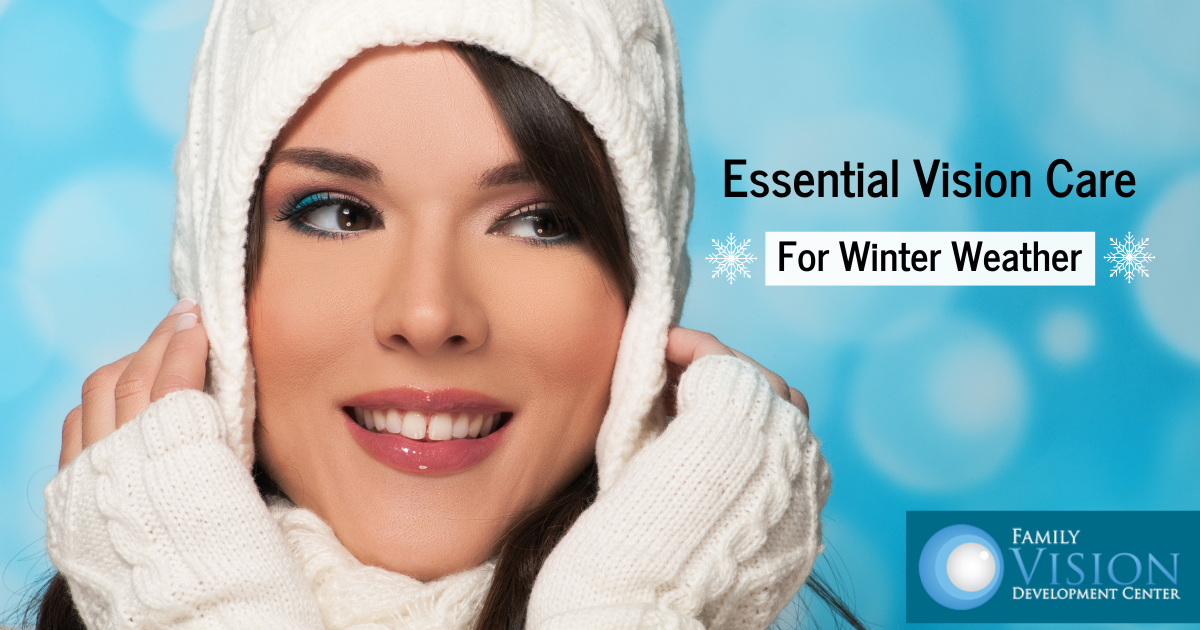Winter months bring dropping temperatures and thoughts of holiday festivities. However, vision care may not be on the top of the list of concerns during this time. But unfortunately, cold weather can present some issues when it comes to your eyes and vision. Here are some tips to keep your eyes protected against winter dangers.
Wear sunglasses
Sun protection is not just a summer concern! Just because it’s winter doesn’t mean the sun’s UV rays can’t harm your eyes. In fact, glare from the sun can be particularly harsh in winter, and UV rays reflecting off surfaces including snow, pavement, metal and water can damage your eyes year-round. UV exposure is associated with an increased risk of cataracts and age-related macular degeneration. Therefore, it is essential to always wear proper sunglasses that block both UVA and UVB rays.
Wear other protective eyewear
Speaking of eye protection, sunglasses are not the only eyewear you might need during winter. Many people like to partake in fun winter sports like skiing or snowmobiling. However, these activities can present risks to your eyes if the proper precautions are not taken. Wearing protective goggles can shield eyes from UV rays and hazardous glare, as well as protect against flying snow and debris.
Keep your Eyes Moisturized
Winter months are notorious for dry indoor air. Prolonged exposure to this lack of humidity can cause your eyes to become irritated, itchy and sore. Additionally, dry air can cause a burning sensation or excessive watering. To combat this, try using a humidifier in your home to add moisture back into the air. Even better, applying artificial tears directly into your eyes can help to lubricate dry eyes and add moisture to the surface of the eye.
Seek Concussion Care Immediately
Unfortunately, winter months come with icy conditions. And that means there is an increased chance of slipping and falling. If you fall and hit your head, you need to take quick action to avoid any lasting effects of a concussion. Concussions can have a significant effect on vision. For example, you might experience blurred or double vision, difficulty focusing, dizziness, headaches, eye pain or light sensitivity. Or you may not even notice any symptoms at all for several days or more.
Even a mild concussion can cause serious vision problems over time, so seek care immediately even if you are not experiencing symptoms right away. We offer specialized care in neuro-optometric vision rehabilitation following a concussion, so contact us for an evaluation as quickly as possible following an injury.
Get a vision exam
Yes, this one can apply at any time of year. But because regular vision exams are so important to maintaining your overall eye health it should be on the list. Winter weather is often dreary, and outside activities can be more limited. So make excellent use of this opportunity to make your appointment for your vision exam! A comprehensive vision exam is often the only way to detect certain vision disorders. And that means you may not realize there is a problem without it. Early detection can mean an earlier opportunity for treatment to begin and a better chance of fully restoring impaired vision. So don’t delay. Make your appointment by calling Family Vision Development Center at 630-862-2020.
Family Vision Development Center is a full-service vision center offering innovative vision therapy services, post-concussive vision rehabilitation, comprehensive vision exams for eyeglasses and contact lenses, management of ocular diseases including glaucoma, diabetes, macular degeneration and cataracts, and a state-of-the-art optical center offering the latest designs in eyewear. We are dedicated to keeping our patients comfortable and well-informed and we will explain every exam and procedure and answer all of your questions. We accept both scheduled and emergency appointments, and offer convenient financing and insurance options to ensure that high-quality vision care is available and affordable to all of our patients.

